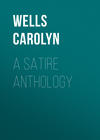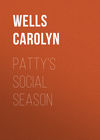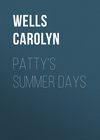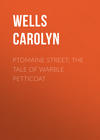Kitabı oku: «A Satire Anthology», sayfa 2
Yazı tipi:
THE WILL
BEFORE I sigh my last gasp, let me breathe,
Great Love, some legacies: Here I bequeathe
Mine eyes to Argus, if mine eyes can see;
If they be blind, then, Love, I give them thee;
My tongue to fame; to embassadors mine ears;
To women or the sea, my tears.
Thou, Love, hast taught me heretofore,
By making me serve her who had twenty more,
That I should give to none but such as had too much before.
My constancy I to the planets give;
My truth to them who at the court do live;
My ingenuity and openness
To Jesuits; to buffoons my pensiveness;
My silence to any who abroad have been;
My money to a Capuchin.
Thou, Love, taught’st me, by appointing me
To love there where no love received can be,
Only to give to such as have an incapacity.
My faith I give to Roman Catholics;
All my good works unto the schismatics
Of Amsterdam; my best civility
And courtship to a university;
My modesty I give to soldiers bare;
My patience let gamesters share.
Thou, Love, taught’st me, by making me
Love her that holds my love disparity,
Only to give to those that count my gifts indignity.
I give my reputation to those
Which were my friends; mine industry to foes;
To schoolmen I bequeathe my doubtfulness;
My sickness to physicians, or excess;
To Nature all that I in rhyme have writ;
And to my company my wit.
Thou, Love, by making me adore
Her who begot this love in me before,
Taught’st me to make as though I gave, when I do but restore.
To him for whom the passing bell next tolls
I give my physic-books; my written rolls
Of moral counsel I to Bedlam give;
My brazen medals unto them which live
In want of bread; to them which pass among
All foreigners, mine English tongue.
Thou, Love, by making me love one
Who thinks her friendship a fit portion
For younger lovers, dost my gifts thus disproportion.
Therefore I’ll give no more, but I’ll undo
The world by dying, because love dies too.
Then all your beauties will no more be worth
Than gold in mines where none doth draw it forth;
And all your graces no more use shall have
Than a sundial in a grave.
Thou, Love, taught’st me, by making me
Love her who doth neglect both thee and me,
To invent and practise this one way to annihilate all three.
John Donne.
SHAKESPEAREAN SATIRE
FROM “KING HENRY IV”
MY liege, I did deny no prisoners;
But I remember, when the fight was done,
When I was dry with rage and extreme toil,
Breathless and faint, leaning upon my sword,
Came there a certain lord, neat, trimly dress’d,
Fresh as a bridegroom; and his chin, new reap’d,
Show’d like a stubble-land at harvest-home.
He was perfuméd like a milliner,
And ’twixt his finger and his thumb he held
A pouncet-box, which ever and anon
He gave his nose and took ’t away again;
Who, therewith angry, when it next came there,
Took it in snuff: and still he smil’d and talk’d,
And as the soldiers bore dead bodies by,
He call’d them untaught knaves, unmannerly,
To bring a slovenly, unhandsome corse
Betwixt the wind and his nobility.
With many holiday and lady terms
He question’d me; among the rest, demanded
My prisoners in your Majesty’s behalf.
I then, all smarting with my wounds being cold,
To be so pester’d with a popinjay,
Out of my grief and my impatience,
Answer’d neglectingly I know not what,
He should, or he should not; for he made me mad
To see him shine so brisk, and smell so sweet,
And talk so like a waiting-gentlewoman
Of guns and drums and wounds – God save the mark! —
And telling me the sovereign’st thing on earth
Was parmaceti for an inward bruise;
And that it was great pity, so it was,
This villainous saltpetre should be digg’d
Out of the bowels of the harmless earth,
Which many a good tall fellow had destroy’d
So cowardly; and but for these vile guns,
He would himself have been a soldier.
This bald, unjointed chat of his, my lord,
I answer’d indirectly, as I said;
And I beseech you, let not this report
Come current for an accusation
Betwixt my love and your high Majesty.
Shakespeare.
FROM “LOVE’S LABOUR’S LOST”
THIS fellow pecks up wit, as pigeons pease,
And utters it again when God doth please.
He is wit’s pedler, and retails his wares
At wakes and wassails, meetings, markets, fairs;
And we that sell by gross, the Lord doth know,
Have not the grace to grace it with such show.
This gallant pins the wenches on his sleeve;
Had he been Adam, he had tempted Eve.
He can carve, too, and lisp; why, this is he
That kiss’d his hand away in courtesy;
This is the ape of form, monsieur the nice,
That, when he plays at table, chides the dice
In honourable terms; nay, he can sing
A mean most meanly; and in ushering,
Mend him who can: the ladies call him sweet;
The stairs, as he treads on them, kiss his feet.
This is the flower that smiles on every one,
To show his teeth as white as whale’s bone;
And consciences that will not die in debt
Pay him the due of honey-tongued Boyet.
…
See where it comes! – Behaviour, what wert thou
Till this man show’d thee? and what art thou now?
Shakespeare.
FROM “AS YOU LIKE IT”
ALL the world’s a stage,
And all the men and women merely players:
They have their exits, and their entrances;
And one man in his time plays many parts,
His acts being seven ages. At first the infant,
Mewling and puking in the nurse’s arms:
Then the whining schoolboy, with his satchel,
And shining morning face, creeping like snail
Unwillingly to school: And then the lover,
Sighing like furnace, with a woful ballad
Made to his mistress’ eyebrow: Then a soldier,
Full of strange oaths, and bearded like the pard,
Jealous in honour, sudden and quick in quarrel,
Seeking the bubble reputation
Even in the cannon’s mouth: And then the justice,
In fair round belly with good capon lin’d,
With eyes severe, and beard of formal cut,
Full of wise saws and modern instances;
And so he plays his part: The sixth age shifts
Into the lean and slipper’d pantaloon,
With spectacles on nose, and pouch on side;
His youthful hose well sav’d, a world too wide
For his shrunk shank; and his big manly voice,
Turning again toward childish treble, pipes
And whistles in his sound: Last scene of all,
That ends this strange eventful history,
Is second childishness and mere oblivion,
Sans teeth, sans eyes, sans taste, sans everything.
Shakespeare.
HORACE CONCOCTING AN ODE
TO thee, whose forehead swells with roses,
Whose most haunted bower
Gives life and scent to every flower,
Whose most adoréd name encloses
Things abstruse, deep, and divine;
Whose yellow tresses shine
Bright as Eoan fire:
Oh, me thy priest inspire!
For I to thee and thine immortal name,
In – in – in golden tunes,
For I to thee and thine immortal name —
In – sacred raptures flowing, flowing, swimming, swimming:
In sacred raptures swimming,
Immortal name, game, dame, tame, lame, lame, lame,
(Foh) hath, shame, proclaim, oh —
In sacred raptures flowing, will proclaim. (No!)
Oh, me thy priest inspire!
For I to thee and thine immortal name,
In flowing numbers filled with spright and flame,
(Good! good!)
In flowing numbers filled with spright and flame.
Thomas Dekker.
ON DON SURLY
DON SURLY, to aspire the glorious name
Of a great man, and to be thought the same,
Makes serious use of all great trade he knows.
He speaks to men with a rhinocerote’s nose,
Which he thinks great; and so reads verses too;
And that is done as he saw great men do.
He has tympanies of business in his face,
And can forget men’s names with a great grace.
He will both argue and discourse in oaths,
Both which are great, and laugh at ill-made clothes;
That’s greater yet, to cry his own up neat.
He doth, at meals, alone his pheasant eat,
Which is main greatness; and at his still board
He drinks to no man: that’s, too, like a lord.
He keeps another’s wife, which is a spice
Of solemn greatness; and he dares, at dice,
Blaspheme God greatly; or some poor hind beat,
That breathes in his dog’s way: and this is great.
Nay, more, for greatness’ sake he will be one
May hear my epigrams, but like of none.
Surly, use other arts; these only can
Style thee a most great fool, but no great man.
Ben Jonson.
THE SCHOLAR AND HIS DOG
I WAS a scholar: seven useful springs
Did I deflower in quotations
Of cross’d opinions ’bout the soul of man;
The more I learnt, the more I learnt to doubt.
Delight my spaniel slept, whilst I baus’d leaves,
Toss’d o’er the dunces, pored on the old print
Of titled words: and still my spaniel slept.
Whilst I wasted lamp-oil, baited my flesh,
Shrunk up my veins: and still my spaniel slept.
And still I held converse with Zabarell,
Aquinas, Scotus, and the musty saw
Of antick Donate: still my spaniel slept.
Still on went I; first, an sit anima;
Then, an it were mortal. Oh, hold, hold! at that
They’re at brain buffets, fell by the ears amain
Pell-mell together; still my spaniel slept.
Then, whether ’t were corporeal, local, fixt,
Ex traduce, but whether ’t had free will
Or no, hot philosphers
Stood banding factions, all so strongly propt,
I stagger’d, knew not which was firmer part,
But thought, quoted, read, observ’d, and pryed,
Stufft noting-books: and still my spaniel slept.
At length he wak’d, and yawned; and by yon sky,
For aught I know he knew as much as I.
John Marston.
THE MANLY HEART
SHALL I, wasting in despair,
Die because a woman’s fair?
Or my cheeks make pale with care
’Cause another’s rosy are?
Be she fairer than the day,
Or the flowery meads in May,
If she be not so to me,
What care I how fair she be?
Shall my foolish heart be pined
’Cause I see a woman kind;
Or a well-disposéd nature
Joinéd with a lovely feature?
Be she meeker, kinder, than
Turtle-dove or pelican,
If she be not so to me,
What care I how kind she be?
Shall a woman’s virtues move
Me to perish for her love?
Or her merit’s value known
Make me quite forget my own?
Be she with that goodness blest
Which may gain her name of Best,
If she seem not such to me,
What care I how good she be?
’Cause her fortune seems too high,
Shall I play the fool and die?
Those that bear a noble mind
Where they want of riches find,
Think what with them they would do
Who without them dare to woo;
And unless that mind I see,
What care I though great she be?
Great or good, or kind or fair,
I will ne’er the more despair;
If she loves me, this believe,
I will die ere she shall grieve;
If she slight me when I woo,
I can scorn and let her go;
For if she be not for me,
What care I for whom she be?
George Wither.
THE CONSTANT LOVER
OUT upon it! I have loved
Three whole days together,
And am like to love three more,
If it prove fair weather.
Time shall moult away his wings
Ere he shall discover
In the whole wide world again
Such a constant lover.
But the spite on ’t is, no praise
Is due at all to me:
Love with me had made no stays,
Had it any been but she.
Had it any been but she,
And that very face,
There had been at least ere this
A dozen dozen in her place.
Sir John Suckling.
THE REMONSTRANCE
WHY so pale and wan, fond lover?
Prithee, why so pale?
Will, when looking well can’t move her,
Looking ill prevail?
Prithee, why so pale?
Why so dull and mute, young sinner?
Prithee, why so mute?
Will, when speaking well can’t win her,
Saying nothing do’t?
Prithee, why so mute?
Quit, quit, for shame! this will not move,
This cannot take her;
If of herself she will not love,
Nothing can make her:
The devil take her!
Sir John Suckling.
SAINTSHIP VERSUS CONSCIENCE
“WHY didst thou choose that cursed sin,
Hypocrisy, to set up in?”
“Because it is the thriving’st calling,
The only saints’ bell that rings all in;
In which all churches are concern’d,
And is the easiest to be learn’d.”
…
Quoth he, “I am resolv’d to be
Thy scholar in this mystery;
And therefore first desire to know
Some principles on which you go.
What makes a knave a child of God,
And one of us?” “A livelihood.”
“What renders beating out of brains,
And murder, godliness?” “Great gains.”
“What’s tender conscience?” “’Tis a botch
That will not bear the gentlest touch;
But, breaking out, despatches more
Than th’ epidemical’st plague-sore.”
“What makes y’ encroach upon our trade,
And damn all others?” “To be paid.”
“What’s orthodox and true believing,
Against a conscience?” “A good living.”
“What makes rebelling against kings
A good old cause?” “Administ’rings.”
“What makes all doctrines plain and clear?”
“About two hundred pounds a year.”
“And that which was prov’d true before,
Prov’d false again?” “Two hundred more.”
“What makes the breaking of all oaths
A holy duty?” “Food and clothes.”
“What, laws and freedom, persecution?”
“Being out of power and contribution.”
“What makes a church a den of thieves?”
“A dean and chapter, and white sleeves.”
“And what would serve, if these were gone,
To make it orthodox?” “Our own.”
“What makes morality a crime,
The most notorious of the time;
Morality, which both the saints
And wicked, too, cry out against?”
“’Cause grace and virtue are within
Prohibited degrees of kin;
And therefore no true saint allows
They shall be suffered to espouse.”
Samuel Butler.
DESCRIPTION OF HOLLAND
A COUNTRY that draws fifty foot of water,
In which men live as in the hold of Nature,
And when the sea does in upon them break,
And drowns a province, does but spring a leak;
That always ply the pump, and never think
They can be safe but at the rate they stink;
They live as if they had been run aground,
And, when they die, are cast away and drowned;
That dwell in ships, like swarms of rats, and prey
Upon the goods all nations’ fleets convey;
And when their merchants are blown up and crackt,
Whole towns are cast away in storms, and wreckt;
That feed, like cannibals, on other fishes,
And serve their cousin-germans up in dishes:
A land that rides at anchor, and is moored,
In which they do not live, but go aboard.
Samuel Butler.
THE RELIGION OF HUDIBRAS
FOR his religion it was fit
To match his learning and his wit:
Twas Presbyterian true blue;
For he was of that stubborn crew
Of errant saints, whom all men grant
To be the true Church militant;
Such as do build their faith upon
The holy text of pike and gun;
Decide all controversies by
Infallible artillery,
And prove their doctrine orthodox,
By apostolic blows and knocks;
Call fire, and sword, and desolation,
A godly, thorough reformation.
Which always must be carried on,
And still be doing, never done;
As if religion were intended
For nothing else but to be mended;
A sect whose chief devotion lies
In odd perverse antipathies;
In falling out with that or this,
And finding somewhat still amiss;
More peevish, cross, and splenetic,
Than dog distract or monkey sick;
That with more care keep holy-day
The wrong, than others the right way;
Compound for sins they are inclin’d to,
By damning those they have no mind to;
Still so perverse and opposite,
As if they worshipped God for spite;
The self-same thing they will abhor
One way, and long another for;
Free-will they one way disavow,
Another, nothing else allow;
All piety consists therein
In them, in other men all sin;
Rather than fail, they will defy
That which they love most tenderly;
Quarrel with minc’d pies, and disparage
Their best and dearest friend, plum porridge;
Fat pig and goose itself oppose,
And blaspheme custard through the nose.
Samuel Butler.
SATIRE ON THE SCOTS
A LAND where one may pray with cursed intent,
Oh, may they never suffer banishment!
Had Cain been Scot, God would have chang’d his doom —
Not forc’d him wander, but confin’d him home.
Like Jews they spread and as infection fly,
As if the devil had ubiquity;
Hence ’tis they live as rovers, and defy
This or that place, rags of geography;
They’re citizens o’ th’ world, they’re all in all;
Scotland’s a nation epidemical.
And yet they ramble not to learn the mode
How to be drest, or how to lisp abroad…
No, the Scots errant fight, and fight to eat;
Their ostrich-stomachs make their swords their meat;
Nature with Scots as tooth-drawers hath dealt,
Who use to string their teeth upon their belt…
Lord! what a godly thing is want of shirts!
How a Scotch stomach and no meat converts!
They wanted food and raiment; so they took
Religion for their seamstress and their cook.
Unmask them well, their honours and estate,
As well as conscience, are sophisticate.
Shrive but their title and their moneys poize,
A laird and twenty pence pronounc’d with noise,
When constru’d but for a plain yeoman go,
And a good sober twopence, and well so.
Hence, then, you proud impostors! get you gone,
You Picts in gentry and devotion,
You scandal to the stock of verse – a race
Able to bring the gibbet in disgrace!
Hyperbolus by suffering did traduce
The ostracism, and sham’d it out of use.
The Indian that heaven did forswear,
Because he heard some Spaniards were there,
Had he but known what Scots in hell had been,
He would, Erasmus-like, have hung between.
My muse hath done. A voyder for the nonce,
I wrong the devil should I pick their bones;
That dish is his; for when the Scots decease,
Hell, like their nation, feeds on barnacles.
A Scot when from the gallow-tree got loose,
Drops into Styx, and turns a Soland goose.
John Cleiveland.
SONG
WHY should you swear I am forsworn,
Since thine I vowed to be?
Lady, it is already morn,
And ’twas last night I swore to thee
That fond impossibility.
Have I not loved thee much and long,
A tedious twelve hours’ space?
I must all other beauties wrong,
And rob thee of a new embrace,
Could I still dote upon thy face.
Not but all joy in thy brown hair
By others may be found;
But I must search the black and fair,
Like skilful mineralists that sound
For treasure in unploughed-up ground.
Then, if when I have loved my round,
Thou prov’st the pleasant she;
With spoils of meaner beauties crowned,
I laden will return to thee,
Even sated with variety.
Richard Lovelace.
THE CHARACTER OF HOLLAND
HOLLAND, that scarce deserves the name of land,
As but the off-scouring of the British sand,
And so much earth as was contributed
By English pilots when they heaved the lead;
Or what by th’ ocean’s slow alluvion fell,
Of shipwrecked cockle and the mussel-shell;
This indigested vomit of the sea
Fell to the Dutch by just propriety.
Glad then, as miners who have found the ore,
They, with mad labour, fished the land to shore;
And dived as desperately for each piece
Of earth as if ’t had been of ambergreese;
Collecting anxiously small loads of clay,
Less than what building-swallows bear away;
Or than those pills which sordid beetles roll,
Transfusing into them their dunghill soul.
How did they rivet, with gigantic piles,
Thorough the centre their new-catched miles;
And to the stake a struggling country bound,
Where barking waves still bait the forcéd ground;
Building their watery Babel far more high
To reach the sea, than those to scale the sky.
Yet still his claim the injured ocean laid,
And oft at leap-frog o’er their steeples played;
As if on purpose it on land had come
To shew them what’s their mare liberum.
A daily deluge over them does boil;
The earth and water play at level-coil.
The fish ofttimes the burgher dispossessed,
And sat, not as a meat, but as a guest;
And oft the Tritons and the sea-nymphs saw
Whole shoals of Dutch served up for cabillau;
Or, as they over the new lever ranged,
For pickled herring, pickled heeren changed.
Nature, it seemed, ashamed of her mistake,
Would throw their land away at duck and drake,
Therefore necessity, that first make kings,
Something like government among them brings;
For, as with pigmies, who best kills the crane,
Among the hungry he that treasures grain,
Among the blind the one-eyed blinkard reigns,
So rules among the drowned he that drains.
Not who first see the rising sun commands,
But who could first discern the rising lands.
Who best could know to pump an earth so leak,
Him they their Lord and Country’s Father speak.
To make a bank was a great plot of state;
Invent a shovel, and be a magistrate.
Hence some small dike-grave unperceived invades
The power, and grows, as ’twere, a king of spades;
But, for less envy, some joined states endures,
Who look like a commission of the sewers:
For these Half-anders, half wet, and half dry,
Nor bear strict service, nor pure liberty.
’Tis probable religion, after this,
Came next in order, which they could not miss.
How could the Dutch but be converted, when
The apostles were so many fishermen?
Besides, the waters of themselves did rise,
And, as their land, so them did rebaptize.
Andrew Marvell.
THE DUKE OF BUCKINGHAM
SOME of their chiefs were princes of the land:
In the first rank of these did Zimri stand,
A man so various that he seemed to be
Not one, but all mankind’s epitome:
Stiff in opinions, always in the wrong,
Was everything by starts, and nothing long;
But, in the course of one revolving moon,
Was chymist, fiddler, statesman, and buffoon;
Then all for women, painting, rhyming, drinking,
Besides ten thousand freaks that died in thinking.
Blest madman, who could every hour employ
With something new to wish or to enjoy!
Railing and praising were his usual themes,
And both, to shew his judgment, in extremes;
So over-violent, or over-civil,
That every man with him was god or devil.
In squandering wealth was his peculiar art;
Nothing went unrewarded but desert:
Beggared by fools, whom still he found too late,
He had his jest, and they had his estate;
He laughed himself from court, then sought relief
By forming parties, but could ne’er be chief;
For, spite of him, the weight of business fell
On Absalom and wise Achitophel.
Thus, wicked but in will, of means bereft,
He left not faction, but of that was left.
John Dryden.
Türler ve etiketler
Yaş sınırı:
12+Litres'teki yayın tarihi:
28 ekim 2017Hacim:
230 s. 1 illüstrasyonTelif hakkı:
Public Domain









